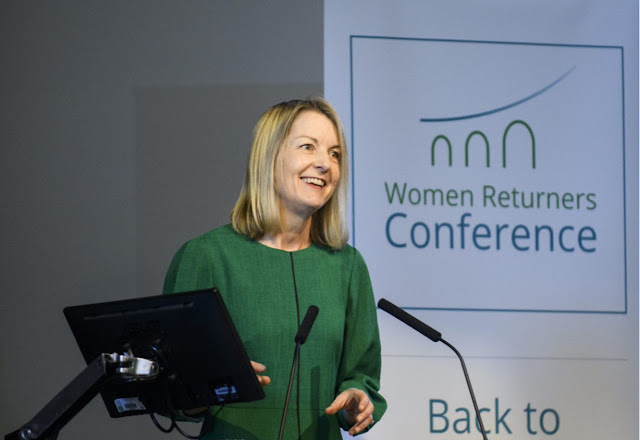At our Women Returners 'Back to Your Future' Conference earlier this summer, our CEO Julianne Miles led a session on how to get focused and develop your return to work career direction. Here are some of the key takeouts.
We find that many returners adopt one of these unhelpful strategies when they want to return to work:
- Treating it like a research project with lots of thinking but little action
- Taking a scattergun approach - randomly applying for a range of jobs online
- Waiting to 'find their passion' or for the 'perfect job' to come along.
For success, it's important to have greater clarity and focus. Julianne explained, "When you're thinking of going back to work, there are three questions you need to answer - why do I want to go back to work? What do I want to do? How do I get there?" This session focused on helping you to answer the first two questions.
Why do I want to go back to work?
Start by working out exactly why you want to return to work. Your motivation is often a mix of different things. It could be a need for mental stimulation, to use your qualifications, or to be a role model for your children. It could be a desire for a more tangible sense of achievement or to get your professional identity back. It could be financial motivation; in this case consider whether you need the money, want to have your own money or want to have the affirmation of being paid what you are worth. As you think about your options, check that you'll be fulfilling your major motivations in the job(s) you're considering.
What do I want to do?
"This is often where people get off track," said Julianne. "They don't recognise that there is a trade-off triangle - it's very difficult to optimise job fulfilment, flexibility and pay/level. I recommend that people start with job fulfilment and then think 'how can I do that flexibly (if this is important to you) and how can I get the salary I want?' A return to work is unlikely to be successful unless you enjoy what you are doing and are getting enough out of the work day-to-day."
There's a lot of evidence that if you orientate your career, and life as a whole, around knowing and using your strengths you are likely to be better at what you do and also to be happier. Often other people are best placed to give you very valuable feedback on your strengths. This is because we tend to underestimate our own strengths as they are often the things that come naturally to us - and we tend to value more the things we find harder.
It's also important to determine your work values - what is most important to you in your working life? Test which aspects you can compromise on and which are make-or-break for you.
Likewise, working out what interests you is very important. What do you enjoy doing? Remember that you're more likely to find your passion if you start off by doing something that interests you, rather than waiting for your passion to appear!
Use these factors to develop your decision criteria. This will help you to develop new options or to narrow down the options you have already identified.
The next step is to actively explore your options.
Julianne said: "Pick two or three options that you have the most energy to investigate. Go out and talk to people to find out more information. Start by talking to family and friends. Go to conferences, seminars - parachute yourself in with lots of people who are already doing what you want to do - and investigate if this could work for you. This way you'll be able to clarify which option best meets your decision criteria. And don't underestimate the intangible aspects - which job feels most like you - as this is equally valuable information."
Sign up to our free network for more advice, support and job opportunities. You’ll find much more help and advice on our website.


